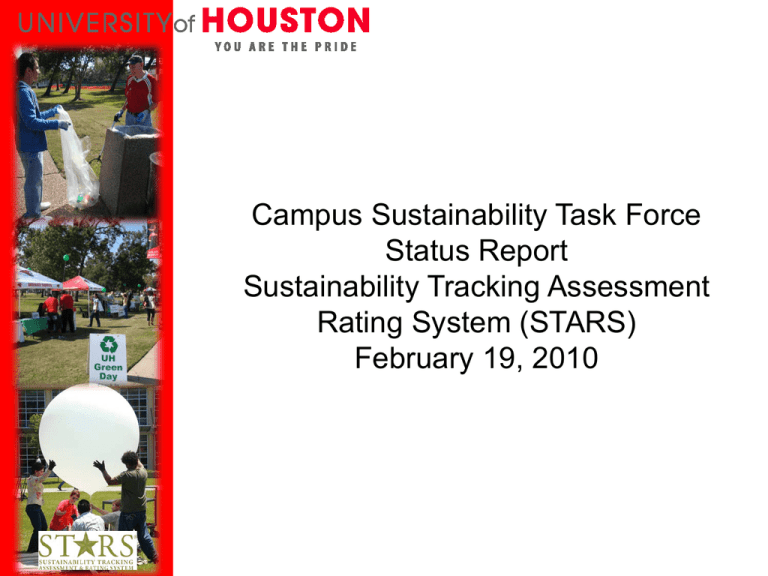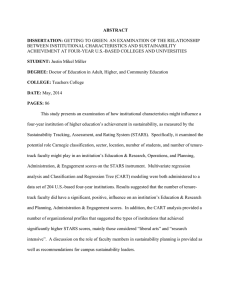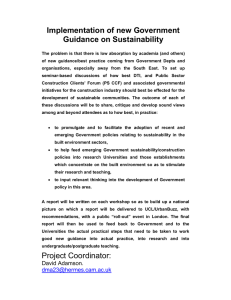Campus Sustainability Task Force Status Report Sustainability Tracking Assessment Rating System (STARS)
advertisement

Campus Sustainability Task Force Status Report Sustainability Tracking Assessment Rating System (STARS) February 19, 2010 STARS Overview What is STARS? Voluntary Framework for understanding sustainability Comparisons over time and across institutions Incentives Information sharing Building a stronger sustainability community STARS Rating Policy 9 CATEGORIESAdministration Climate Change and Energy Food and Recycling Green Building Student Involvement Transportation Endowment Transparency Investment Priority Share holder Engagement. Rating Level: STARS Bronze 25 STARS Silver 45 STARS Gold 65 STARS Platinum 85 STARS Reporter Co-Curricular Education Sustainability learning experiences outside the formal curriculum Institution sponsored Co-curricular activities Environmental student group Campus community garden Recycle - Mania UH- green day Commuter fair UH Co-Curricular Benchmark Credit number Credit Title STARS possible points UH Actual points ER Credit 1 Student Sustainability Educators Program 5 5 ER Credit 2 Student Sustainability Outreach Program 5 5 ER Credit 3 Sustainability in New student Orientation 2 2 ER Credit 4 Sustainability Outreach and Publication 4 4 Tier Two Co-curriculum education Tier Two Credits 1 Student Group 0.25 .25 2 Organic Garden 0.25 .25 3 Model Dorm Room 0.25 0 4 Emerging Goal - Themed Housing 0.25 5 Sustainable Enterprise 0.25 0 6 Sustainability Events 0.25 .25 7 Outdoor Programs 0.25 .25 8 Themed Semester of the Year 0.25 0 18 17.00 TOTAL R STARS Co-Curricular Score = 94.44%r Curriculum Training and educating future leaders about sustainability challenges Recognizes institutions with formal education programs and courses that address sustainability UH Curriculum Benchmarks Credit number Credit Title STARS possible points UH Actual points ER Credit 5 Emerging Goal - Sustainability Course Identification 3 3 ER Credit 6 Emerging Goal - Sustainability-Focused Courses 10 2.361 ER Credit 7 Emerging Goal -Sustainability-Related Courses 10 0.464 ER Credit 8 Sustainability Courses by Department 7 ER Credit 9 Sustainability Learning Outcomes 10 ER Credit 10 Undergraduate Program in Sustainability 4 4 ER Credit 11 Graduate Program in Sustainability 4 4 ER Credit 12 Sustainability Immersive Experience 2 ER Credit 13 Sustainability Literacy Assessment 2 ER Credit 14 Incentives for Developing Sustainability Courses 3 TOTAL R STARS Curriculum Score = 25.14% 55 13.825 Research Conducting research related to or focused on sustainability. Refining theories and concepts to help the world understand sustainability challenges and develop new technologies, strategies, and approaches to address those challenges. UH Research Benchmarks Credit number Credit Title STARS possible points ER Credit 15 Emerging Goal - Sustainability Research Identification 3 ER Credit 16 Emerging Goal - Faculty Involved in Sustainability Research 10 ER Credit 17 Departments Involved in Sustainability Research 6 ER Credit 18 Sustainability Research Incentives 6 ER Credit 19 Interdisciplinary Research in Tenure and Promotion 2 TOTAL R STARS Research Score = 0% 27 UH Actual points Buildings Recognizes taking steps to improve the sustainability performance of their buildings. Maintaining Indoor / Outdoor Air Quality Quick Facts: Buildings = largest user of energy & largest source of greenhouse gas emissions on campuses. UH Buildings Benchmark Credit number Credit Title STARS possible points UH Actual points OP Credit 1 Emerging Goal - Building Operations and Maintenance 7 0.205 OP Credit 2 Emerging Goal - Building Design and Construction 4 0.12 OP Credit 3 Indoor Air Quality 2 2 13 2.205 TOTAL R STARS Building Score = 17.88% Climate Recognizes measurements greenhouse gas emissions Global warming potency = 1. 2. 3. 4. 5. 6. and reduction of includes increased frequency and sea level rise species extinction water shortages declining agricultural production spread of diseases extreme weather events UH Climate Benchmark Credit number Credit Title STARS possible points UH Actual points OP Credit 5 Greenhouse Gas Emissions Inventory 2 2 OP Credit 6 Emerging Goal - Greenhouse Gas Emissions Reduction 14 Tier Two Climate Tier Two Credits 1 Emerging Goal - Air Travel Emissions 0.25 2 Local Offsets Program 0.25 0 16.50 2 TOTAL R STARS Climate Score =12.12 % Dining Services Recognizes building a sustainable food system Definition of Sustainable food: The produce is bought within 250miles of the University. Quick Facts: Long-distance transportation of food = greenhouse gas emissions and other pollution Dining Services=important role in conserving energy and water, reducing waste, and purchasing environmentally preferable materials STARS measures these impacts across the institution; capturing benefits in the Energy, Water, Waste and Purchasing subcategories UH Dining Services Benchmark Credit number Credit Title STARS possible points UH Actual points OP Credit 6 Food Purchasing 6 0.24 Tier Two Dining Services Tier Two Credits 1 Trayless Dining 0.25 .25 2 Vegetarian and Vegan Dining 0.25 .25 3 Trans-Fats 0.25 .25 4 Guidelines for Franchisees 0.25 .25 5 Pre-Consumer Food Waste Composting 0.25 .25 6 Post-Consumer Food Waste Composting 0.25 .25 7 Food Donation 0.25 0 8 Recycled Content Napkins 0.25 .25 9 Reusable Mug Discounts 0.25 .25 10 Reusable To-Go Containers 0.25 .25 8.50 2.49 TOTAL R STARS Dining Services Score = 29.29% Energy Reduce energy consumption Cleaner and renewable sources of energy i.e. solar, wind, geothermal, and low-impact hydropower Quick Facts: •Energy consumption is the largest source of greenhouse gas emissions, which cause global warming •Energy consumption for 2008-2009 was 194MKWh/yr = Energy for 19,000 homes/yr •Cost: $15million/yr •Switching off all the computers and laptops can possibly save up to $250,000/yr UH Energy Benchmark Credit number Credit Title STARS possible points UH Actual points OP Credit 7 Building Energy Consumption 8 8 OP Credit 8 Clean and Renewable Energy 7 0.0003 Tier Two Energy Tier Two Credits 1 Timers for Temperature Control 0.25 .25 2 Lighting Sensors 0.25 .25 3 LED Lighting 0.25 .25 4 Emerging Goal - Vending Machine Sensors 0.25 5 Energy Management System 0.25 .25 6 Energy Metering 0.25 .25 16.50 8.2503 TOTAL R STARS Energy Score = 56.06% Grounds Recognizes institutions that plan and maintain their grounds with sustainability in mind. Minimizing the use of: • toxic chemicals • protecting wildlife habitat • conserving water and resources UH Ground Benchmark Credit number Credit Title STARS possible points UH Actual points OP Credit 9 Integrated Pest Management 2 0 Tier Two Grounds Tier Two Credits 1 Native Plants 0.25 .25 2 Wildlife Habitat 0.25 .25 3 Tree Campus USA 0.25 0 4 Snow and Ice Removal 0.25 0 5 Compost 0.25 .25 3.25 0.75 TOTAL R STARS Ground Score =23.07 % Purchasing Recognizes institutions that are using their purchasing power to help build a sustainable economy. Purchasing decision = opportunity for institutions to choose environmentally and socially preferable products, services and support companies with strong commitments to sustainability. UH Purchasing Benchmark Credit number Credit Title STARS possible points UH Actual points OP Credit 10 Computer Purchasing 2 0 OP Credit 11 Cleaning Products Purchasing 2 0 OP Credit 12 Office Paper Purchasing – Emerging Goal 2 OP Credit 13 Vendor Code of Conduct 1 0 Tier Two Purchasing Tier Two Credits 1 Historically Underutilized Businesses 0.25 .25 2 Local Businesses 0.25 .25 7.50 .5 TOTAL R STARS Purchasing Score =6.67 % Transportation Recognize institutions that are moving towards sustainable transport systems Transportation = major source of greenhouse gas emissions and other pollutants Institutions may realize cost savings and help support local economies by reducing their dependency on petroleum based fuels for transportation. Quick Fact: 1 gallon of fuel burned by a vehicle releases 19 pounds of CO2 in the atmosphere UH Transportation Benchmark Credit number Credit Title STARS possible points UH Actual points OP Credit 14 Campus Fleet 2 0.35 OP Credit 15 Student Commute Modal Split 4 0.612 OP Credit 16 Employee Commute Modal Split 3 0.41 Tier Two Transportation Tier Two Credits 1 Bicycle Sharing 0.25 0 2 Facilities for Bicyclists 0.25 0 3 Bicycle Plan 0.25 0 4 Mass Transit 0.25 .25 5 Condensed Work Week 0.25 0 6 Telecommuting 0.25 0 7 Emerging Goal - Carpool Matching 0.25 8 Cash-out of Parking 0.25 0 9 Carpool Discount 0.25 .25 10 Local Housing 0.25 0 11 Emerging Goal - Prohibiting Idling 0.25 12 Emerging Goal - Car Sharing 0.25 . 12 1.872 R TOTAL STARS Transportation Score =15.60 % Waste Reduction Recognizes institutions that are moving toward zero waste by reducing, reusing, recycling, and composting. Quick Fact: • Cost of disposing the garbage in the landfill = $50,000/yr • 2008-2009 waste diversion was 26% • Recycle Mania 2009 waste diversion was 33% UH Waste Reduction Benchmark Credit number Credit Title STARS possible points UH Actual points OP Credit 17 Waste Reduction 5 0 OP Credit 18 Waste Diversion 3 0.715 OP Credit 19 Construction and Demolition Waste Diversion 1 0.211 OP Credit 20 Electronic Waste Recycling Program 1 0.5 OP Credit 21 Hazardous Waste Management 1 1 Tier Two Waste Tier Two Credits 1 Materials Exchange 0.25 .25 2 Limiting Printing 0.25 .25 3 Materials Online 0.25 .25 4 Chemical Reuse Inventory 0.25 .25 5 Move-In Waste Reduction- Emerging goal 0.25 6 Move-Out Waste Reduction- Emerging goal 0.25 TOTAL R STARS Waste Score = 27.41% 12.50 3.426 UH Water Definition Recognizes institutions conserving water and protecting water quality Reduce energy consumption and the greenhouse gas emissions associated with energy generation by conserving water. Quick Fact: Water consumption in 2008-2009 was 358Mgallons which is 17% less than 2004-2005 UH Water Benchmark Credit number Credit Title STARS possible points UH Actual points OP Credit 22 Water Consumption 7 4.76 OP Credit 23 Storm water Management 2 2 Tier Two Water Tier Two Credits 1 Waterless Urinals 0.25 .25 2 Building Water Metering 0.25 .25 3 Non-Potable Water Usage 0.25 .25 4 Xeriscaping 0.25 0 5 Weather-Informed Irrigation 0.25 .25 10.25 7.76 TOTAL R STARS Water Score = 75.7% Co-ordination and Planning Dedicate resources to sustainability coordination, incorporating sustainability into their primary campus plans, and developing plans to move towards sustainability. Staff and other resources help an institution organize, implement, and publicize sustainability initiatives. These resources provide the infrastructure that fosters sustainability within an institution. These important documents establish an institution’s priorities and influence budgeting and decision making. Sustainability plans and climate plans provide a road map for how to achieve sustainability goals. UH Co-ordination and Planning Benchmark Credit number Credit Title STARS possible points UH Actual points PAE Credit 1 Sustainability Coordination 3 3 PAE Credit 2 Strategic Plan 6 6 PAE Credit 3 Physical Campus Plan 4 4 PAE Credit 4 Sustainability Plan 3 3 PAE Credit 5 Emerging Goal - Climate Plan 2 TOTAL R STARS Score = 88.89 % 18 16 Diversity and Affordability Recognize institutions that are working to advance diversity and affordability on campus. People of color and low-income communities tend to suffer disproportionate exposure to environmental problems. Higher education opens doors to opportunities that can help create a more equitable world. In addition, a diverse student body, faculty, and staff provide rich resources for learning and collaboration. UH Diversity and Affordability Benchmark Credit number Credit Title STARS possible points UH Actual points PAE Credit 6 Diversity and Equity Coordination 2 2 PAE Credit 7 Measuring Campus Diversity Culture 2 2 PAE Credit 8 Support Programs for Under-Represented Groups 2 2 PAE Credit 9 Support Programs for Future Faculty 4 4 PAE Credit 10 Affordability and Access Programs 3 0 Tier Two Diversity and Affordability Tier Two Credits 1 Gender Neutral Housing 0.25 0 2 Employee Training Opportunities 0.25 .25 3 Student Training Opportunities 0.25 .25 13.75 10.50 TOTAL R STARS Score =76.36 % Human Resources Recognize institutions that have incorporated sustainability into their human resources programs and policies. Investment in human resources is integral to the achievement of a healthy and sustainable balance between human capital, natural capital, and financial capital. In addition, this subcategory recognizes faculty and staff training and development programs in sustainability. Equipping faculty and staff with the tools, knowledge, and motivation to adopt behavior changes that promote sustainability is an essential activity of a sustainable campus. UH Human Resources Benchmark Credit number Credit Title STARS possible points UH Actual points PAE Credit 11 Sustainable Compensation 8 8 PAE Credit 12 Employee Satisfaction Evaluation 2 2 PAE Credit 13 Staff Professional Development in SustainabilityEmerging Goal 2 PAE Credit 14 Sustainability in New Employee Orientation 2 PAE Credit 15 Employee Sustainability Educators ProgramEmerging Goal 5 Tier Two Human Resources Tier Two Credits 1 Childcare 0.25 .25 2 Employee Wellness Program 0.25 .25 3 Socially Responsible Retirement Plan 0.25 0 19.75 12.50 TOTAL R STARS Score =63.29 % 2 Investment Recognize institutions that make investment decisions that promote sustainability Schools with transparent and democratic investment processes promote accountability and engagement by the campus and community Investing in these companies also supports the development of sustainable products and services UH Investment Benchmark Credit number Credit Title STARS possible points UH Actual points PAE Credit 16 Committee on Socially Responsible Investment 2 2 PAE Credit 17 Shareholder Advocacy 5 0 PAE Credit 18 Positive Sustainability Investments 9 0 Tier Two Investment Tier Two Credits 1 Student-Managed SRI Fund 0.25 0 2 Socially Responsible Investment Policy 0.25 0.25 3 Investment Disclosure 0.25 0.25 16.75 2.5 TOTAL R STARS Score = 14.93% Public Engagement This subcategory seeks to recognize institutions that give back to their communities through community service, engagement, and partnerships. Community engagement can help students develop leadership skills while deepening their understandings of practical, real-world problems. For example, faculty research and courses can focus on how to address community problems. UH Public Engagement Benchmark Credit number Credit Title STARS possible points UH Actual points PAE Credit 19 Community Sustainability Partnerships 2 2 PAE Credit 20 Inter-Campus Collaboration on Sustainability 2 2 PAE Credit 21 Emerging Goal - Sustainability in Continuing Education 7 PAE Credit 22 Emerging Goal - Community Service Participation 6 PAE Credit 23 Emerging Goal - Community Service Hours 6 PAE Credit 24 Sustainability Policy Advocacy 4 0 PAE Credit 25 Trademark Licensing 4 2 Tier Two Public Engagement Tier Two Credits 1 Emerging Goal - Graduation Pledge 0.25 2 Community Service on Transcripts 0.25 0 3 Farmers’ Markets 0.25 0.25 31.75 6.25 TOTAL R STARS Score =19.69% Current UH STARS Score=36.55% Current STARS Ranking Would Be: Bronze THANK YOU



